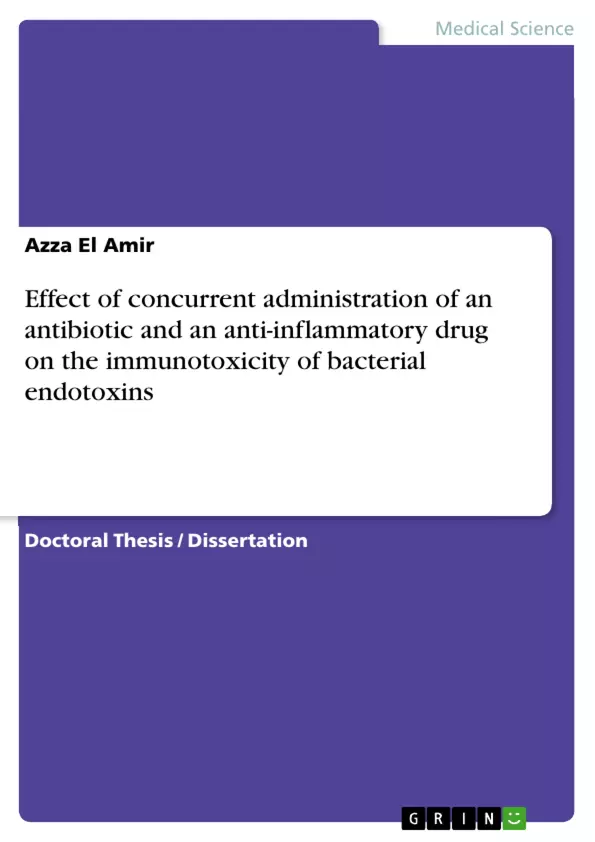P. aeruginosa is a gram-negative bacterium that causes a variety of diseases in compromised hosts. Bacterial endotoxins such as LPS are the major outer surface membrane components present in almost all gram-negative bacteria and act as extremely strong stimulators of innate immunity and inflammation of the airway. The present study was undertaken to determine the effect of combined administration of Gentamicin (GENT) as antibiotic and Dexamethasone (DEXA) as ant-inflammatory drug on some physiological, immunological and histological parameters. After determination of LD50 of P. aeruginosa, mice groups were injected with DEXA, GENT and LPS alone or in combination. LPS single injection caused a significant increase of total protein, globulin, total leukocyte count, lymphocytes, neutrophils and level of IgM and IgG. DEXA induced an increase of serum total lipid, ALT and AST levels, neutrophilia and lymphopenia. GENT administration increased serum total protein, globulin, total lipid, ALT and AST levels. Physiological and immunological examination demonstrated that combined treatment has a significant effect as decreaseing serum total protein, globulin, lymphocytes and IgG level than single treatment. Histological examination demonstrated that the inflammation of thymus, spleen, lymph node and liver decreases in mice received combined treatment than those received individual treatment. Concurrent administration of DEXA and GENT has greatest effect in protecting organs against damage in case of endotoximia.
Inhaltsverzeichnis (Table of Contents)
- Abstract
- Introduction and Aim of Work
- Review of Literature
- Materials and Methods
- Results
- Discussion
- Summary
- References
Zielsetzung und Themenschwerpunkte (Objectives and Key Themes)
This study investigates the impact of concurrent administration of an antibiotic (Gentamicin) and an anti-inflammatory drug (Dexamethasone) on the immunotoxicity of bacterial endotoxins. The focus is on the effects of these drugs on physiological, immunological, and histological parameters in mice challenged with Pseudomonas aeruginosa endotoxin (LPS).
- Immunotoxicity of bacterial endotoxins
- Effects of Gentamicin and Dexamethasone on immune responses
- Physiological and histological changes induced by LPS, Gentamicin, and Dexamethasone
- The impact of combined drug administration on endotoxemia
- Potential protective effects of combined treatment against organ damage
Zusammenfassung der Kapitel (Chapter Summaries)
The "Abstract" provides a concise overview of the study, highlighting the key findings. "Introduction and Aim of Work" introduces Pseudomonas aeruginosa and its endotoxin (LPS), emphasizing their role in infections and the potential dangers of endotoxemia. The "Review of Literature" delves into previous research on LPS, its effects on the immune system, and the potential benefits of glucocorticoids and aminoglycoside antibiotics in managing endotoxin-related complications.
Schlüsselwörter (Keywords)
This study focuses on the key concepts of Pseudomonas aeruginosa, bacterial endotoxin (LPS), Dexamethasone, Gentamicin, immunotoxicity, inflammation, physiological parameters, immunological responses, and histological changes. The research also explores the potential protective effects of combined treatment against organ damage in cases of endotoxemia.
Frequently Asked Questions
What is the focus of this study on bacterial endotoxins?
The study investigates how the combined administration of an antibiotic (Gentamicin) and an anti-inflammatory drug (Dexamethasone) affects the immunotoxicity caused by P. aeruginosa endotoxins (LPS).
What effects does LPS have on the immune system?
LPS (Lipopolysaccharide) acts as a strong stimulator of innate immunity, causing significant increases in leukocyte counts, lymphocytes, and levels of IgM and IgG antibodies.
How does Dexamethasone influence physiological parameters?
Dexamethasone (DEXA) can induce increases in serum total lipids, liver enzymes (ALT and AST), and cause changes like neutrophilia and lymphopenia.
What are the benefits of combining Gentamicin and Dexamethasone?
The combined treatment showed a significant decrease in serum total protein and IgG levels compared to single treatments, and it reduced inflammation in organs like the liver and spleen.
Does the combination therapy protect organs during endotoxemia?
Yes, histological examinations demonstrated that concurrent administration of DEXA and GENT has the greatest effect in protecting organs against damage caused by endotoxins.
What bacterium was used in this research?
The study used Pseudomonas aeruginosa, a gram-negative bacterium known for causing diseases in compromised hosts.
- Citation du texte
- Azza El Amir (Auteur), 2014, Effect of concurrent administration of an antibiotic and an anti-inflammatory drug on the immunotoxicity of bacterial endotoxins, Munich, GRIN Verlag, https://www.grin.com/document/276241



